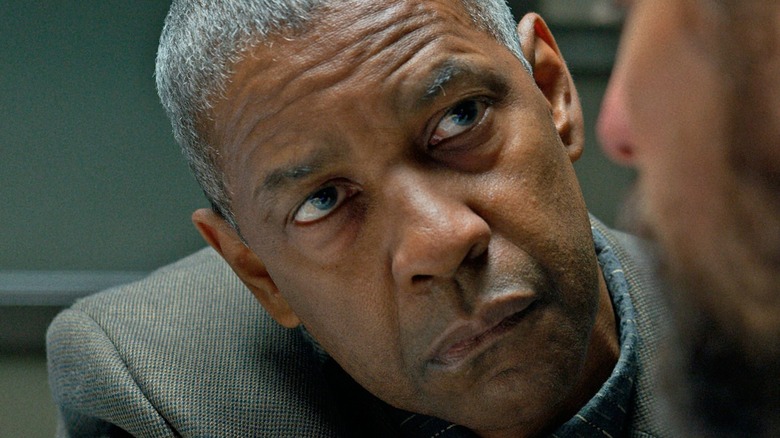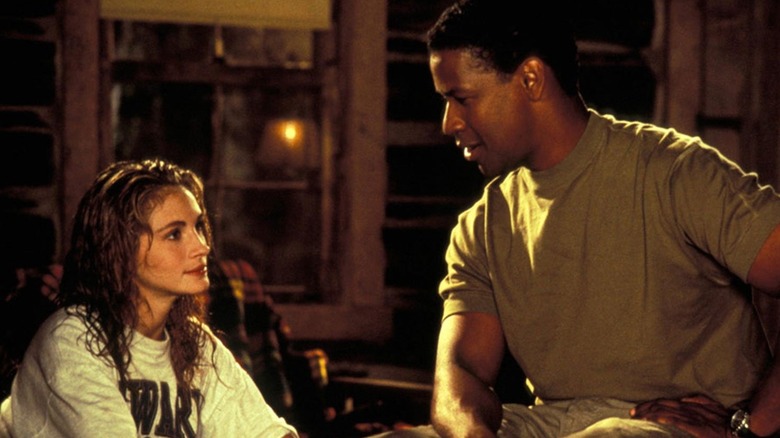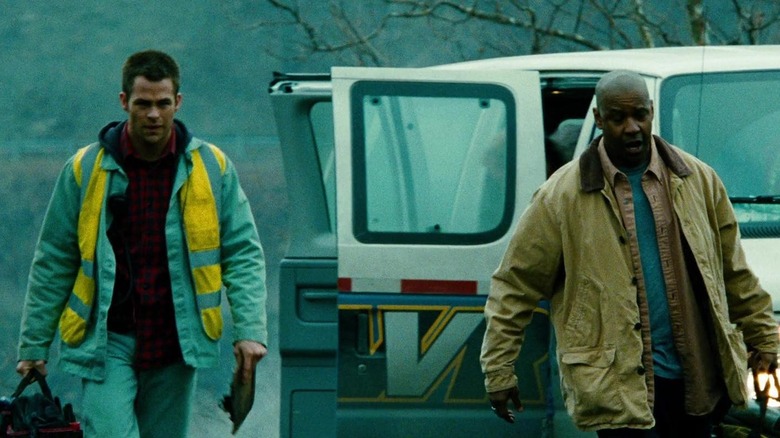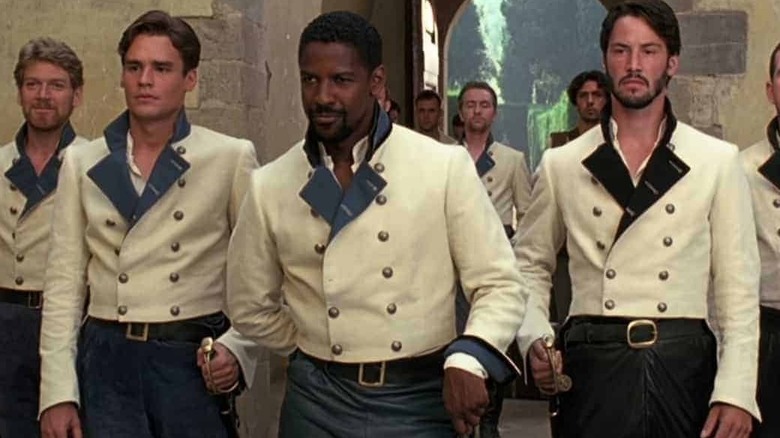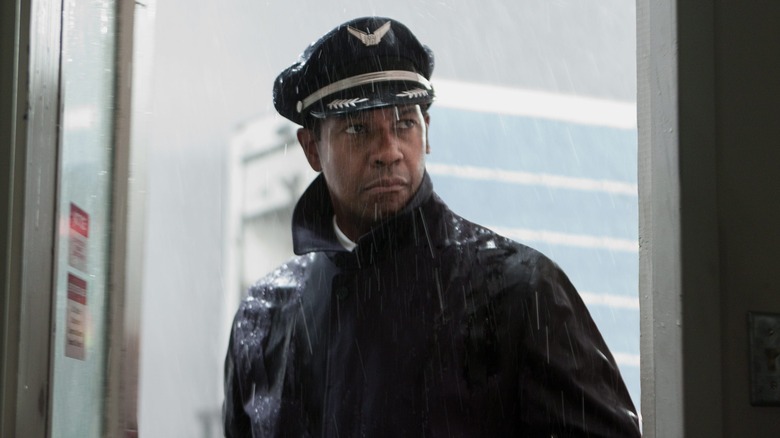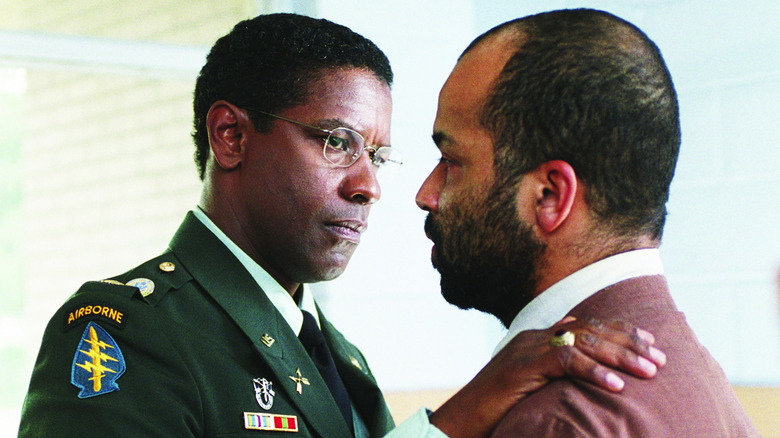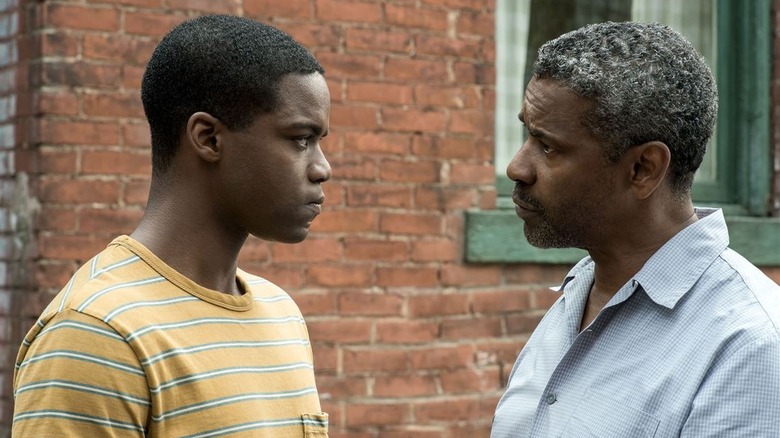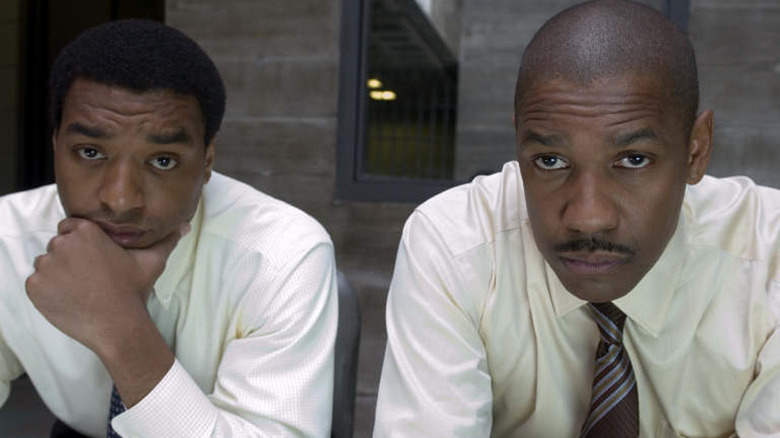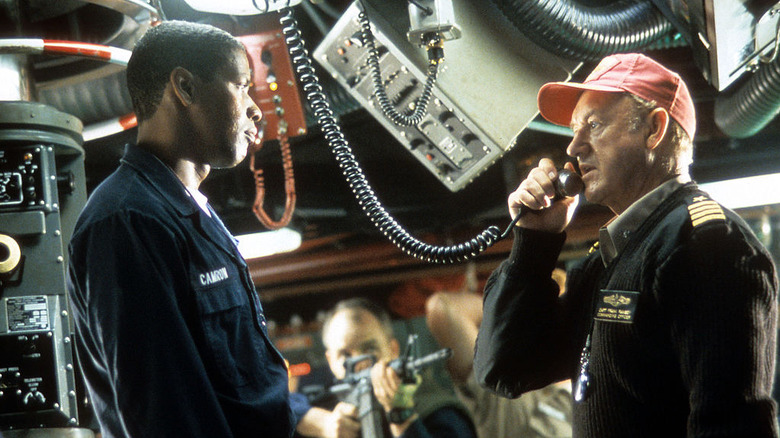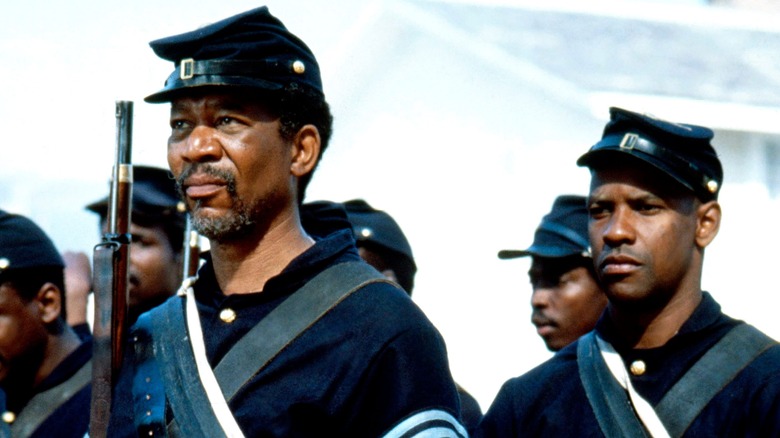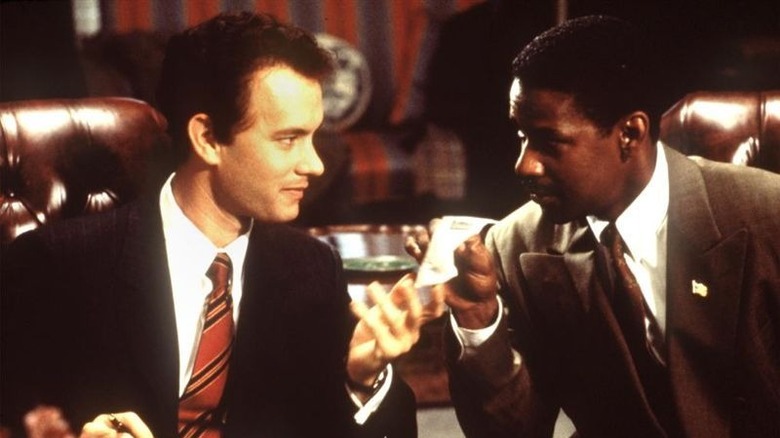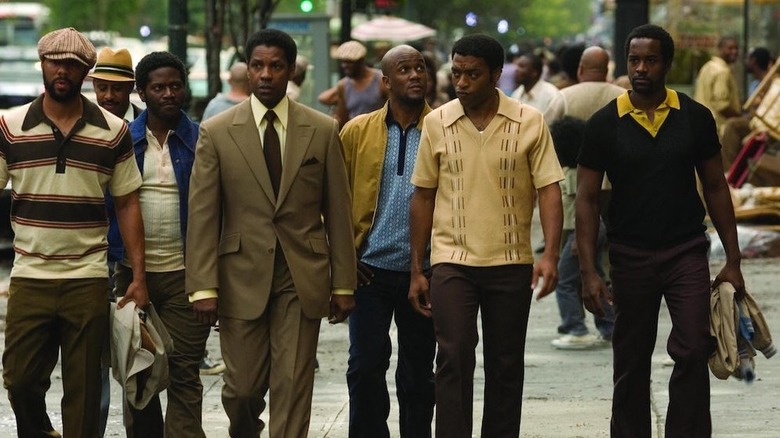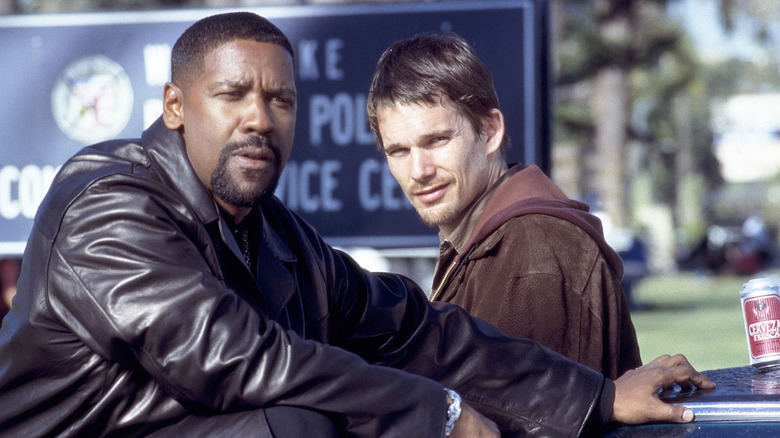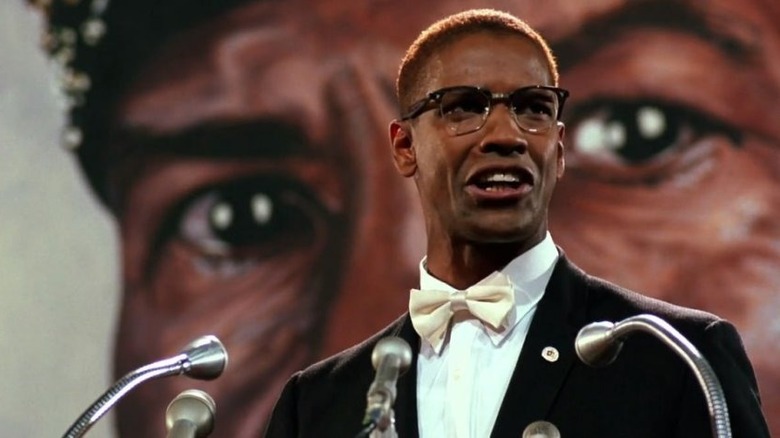Other Denzel Washington Movies You Should Watch After The Little Things
"The Little Things" is an entertaining throwback to neo-noir investigative thrillers that debuted in January, 2021. The film's pulpy storyline and ambiguous ending elevated it above other "Se7en" wannabes, but really, it was the film's incredible cast that garnered attention. Recent Academy Award winners Rami Malek and Jared Leto brought to depth to their respective roles, but both were overshadowed by their co-star Denzel Washington.
One of the most acclaimed actors of all-time, Washington has been a prominent figure in the film industry since the '80s. In an era in which superheroes and known franchises are bigger draws than old-fashioned movie stars, Washington is the rare performer who can bring in a crowd with his name alone.
Washington earned that audience through his incredible body of work. A two-time Academy-Award winner for "Glory" and "Training Day," Washington's powerful dramatic performances are frequent awards contenders. Expectations are high for his upcoming role in Joel Coen's adaptation of "The Tragedy of Macbeth." He has also successfully stepped behind the camera as a director and producer. Washington's involvement in a project often grants it legitimacy, but that doesn't mean that Washington can't have fun too, frequently starring in action films and thrillers.
It's no easy task narrowing down Washington's best films, as he rarely gives a bad performance. However, fans of "The Little Things" should definitely check out these Washington movies.
The Pelican Brief
In the '90s, many legal thrillers adapted from John Grisham novels hit theaters. "The Pelican Brief" is among the best, thanks to the fantastic performances. Julia Roberts stars as Darby Shaw, a brilliant Harvard student who discovers that the mysterious deaths of two Supreme Court justices are linked to a greedy oil tycoon.
She's aided in her pursuit by Washington's character, Gary Grantham, an investigative reporter keen to crack the mystery before more people are assassinated. Grantham is principled but not idealistic, and his world-weariness contrasts with Shaw's innocent perspective. Washington shows his protective side as Grantham risks his career in order to ensure Shaw's safety, and the closing moments, in which he expresses his pride in seeing her grow, are very moving.
Washington and Roberts have terrific chemistry, and it's interesting to see them develop a working relationship, not a romance. The intricate plot requires the viewer to pay close attention, but the performances are so compelling that even the expositional scenes are engaging.
Unstoppable
Washington frequently worked with director Tony Scott, and "Unstoppable" is among their most underrated collaborations. The film highlights the everyday heroism of a community of railroad employees who work together to stop a runaway train. Washington's character, Frank Barnes, is an experienced engineer tasked with guiding the novice conductor Will Colson (Chris Pine) in this dangerous mission.
Washington and Pine have great chemistry. Colson is initially averse to pressing his mentor for advice outside of work, but opens up to the older man about his fractured home life and the ongoing custody case for his child. Barnes is in the opposite position, as his loving family gives him the motivation to survive their dangerous mission, and Washington shows empathy in reaching out to his young colleague. The closing moments, in which both men reconnect with their families, are quite touching.
"Unstoppable" is frantically paced, and Scott rarely slows down for a sentimental moment. While Washington doesn't have any big stirring speeches, his professional demeanor is powerful considering the dangerous circumstances he finds himself in. Scott's final film concluded his career on a high note, and it was only right that Washington is at its center.
Much Ado About Nothing
Washington used his experience on the stage to deliver a standout performance in Kenneth Branagh's adaptation of one of Shakespeare's most famous comedies. Theater actors Robert Shawn Leonard and Richard Briers aren't entirely comfortable working in front of a camera, and established movie stars Keanu Reeves and Michael Keaton struggle with the Bard's complex dialogue. However, Washington comfortably translates Shakespeare's classic words to a new medium.
Branagh's reimagining of "Much Ado About Nothing" is very melodramatic, requiring the cast to exaggerate their performances for comedic effect. Washington is best known for dramatic roles, but he nails the physical comedy needed for his performance as the Prince of Eragon, Don Pedro. Washington's charisma is unparalleled, and he retains his dignity even after his romantic pursuits of Beatrice (Emma Thompson) halt when he learns of her attraction to Benedict (Branagh).
Although "Much Ado About Nothing" is one of Washington's funniest performances, he's able to navigate tonal shifts and add weight to the gripping final confrontation with his evil half-brother Don John (Reeves). Branagh's heightened comedic approach would feel feckless if these pivotal moments weren't successfully handled.
Flight
"Flight" begins with one of the most gripping plane crash sequences in film history as pilot Captain Whip Whitaker (Washington) successfully lands a SouthJet flight during a violent storm. Whitaker maintains a calm attitude during a terrifying situation and reassures his passengers, but his heroism is immediately questioned when it's discovered that Whitaker is an addict who was drunk and consumed drugs prior to the landing.
Washington balances Whitaker's bravery with his less-savory attributes, and shows how his addictive personality damages his home life. Washington forces viewers to question whether he is inherently good or only circumstantially noble; the ambiguous ending of "Flight" doesn't definitively answer the question. Whitaker's son interviews him about his values during the final scene, and the pilot isn't sure how to be honest with his child or himself.
Washington shows different sides of Whitaker through interactions with his co-stars; his drug dealer Charlie Anderson (John Goodman) brings out the character's wild irresponsibility, but intimate conversations with his girlfriend Nicole (Kelly Reilly) reveal a softer side. Washington elevates the entire ensemble with one of his most complex performances to date.
The Manchurian Candidate
"The Manchurian Candidate" is a brilliant reimagining of the 1962 classic that trades Cold War paranoia for a commentary about how corrupt political leaders impacted the conflict in the Middle East. Washington stars as Gulf War veteran Major Bennett Marco, who reconnects with his former squad mate Raymond Shaw (Liev Schreiber). Shaw was awarded the Medal of Honor for saving several lives during a critical mission and is now being floated as a Vice Presidential candidate. His success is bolstered by influence of his mother Elanor (Meryl Streep), a prominent Democratic senator with ties to a covert operation.
Washington's performance is unlike the confident roles he's known for, as Marco is awkward and has trouble expressing himself. Marco grows obsessed with a conspiracy to brainwash returning soldiers, and Washington is excellent as an idiosyncratic loner who everyone else thinks is crazy. Director Jonathan Demme is known for his intimate humanism, and isolated closeups of the characters as they realize they've been manipulated ramp up the tension. Thanks to Demme's delicacy and Washington's untraditional performance, "The Manchurian Candidate" is a remake that surpasses the original.
Fences
"Fences" is both Washington's most refined work as a director and a showcase for one of his strongest performances. Washington and co-star Viola Davis had earned already Tony Awards for the Broadway revival of August Wilson's Pulitzer Prize-winning play, and while work adapted from the stage often fails to translate to the screen, Washington addresses potential problems with "Fences" by creatively reimagining the play's sets as a lived-in environment.
The locations are sparse, and Washington uses limited movement to isolate the performances. Set in a poor Pittsburg community during the '50s, "Fences" follows garbage man Troy (Washington), who is forced to admit his infidelity to his wife Rose (Davis) and their teenage son Cory (Joven Adepo). All three characters are consumed by repressed anger. Troy feels that his family isn't grateful that he works at a grueling day job. Rose is infuriated that her husband ignores her contributions to the household. Troy despises his father's condescending attitude.
The suspense that builds as the three characters' anger festers is as exciting as any of Washington's action films. While only a select few may have gotten the opportunity to see the Broadway show, the film adaptation of "Fences" is a worthy recreation of the experience.
Inside Man
Spike Lee and Washington are both known for telling dramatic stories that tackle timely social issues, and yet in "Inside Man" they're simply having fun. The heist thriller stars Washington as NYPD hostage negotiator Detective Keith Frazier, who is called in when criminal mastermind Dalton Russell (Clive Owen) takes over a leading Wall Street bank. Frazier and Owen only communicate over the phone, while Frazier tries to save the lives of the bank's staff and customers.
Lee inserts some social satire into the film, of course; Frazier's attention is diverted when power broker Madeline White (Jodie Foster) pressures him to protect the property of the bank's chairman Arthur Case (Christopher Plummer) instead of the hostages. Frazier ignores the greedy parties, but ends up forced to appease them in order to get the resources he needs to complete the rescue. Frazier is tormented by Russell's cruel threats, and Washington does a fantastic job playing an experienced cop who keeps his cool in a stressful situation.
"Inside Man" grows intense as violence threatens to break out, and the relationship between Frazier and Russell is fascinating. Frazier marvels at Russell's inventiveness and agrees with his sentiments regarding corporate greed, yet he fears that innocent lives will be caught in the crossfire. With a terrific twist ending, "Inside Man" is among Washington's most purely enjoyable films.
Crimson Tide
"Crimson Tide" may contain Washington's bravest performance. Not only is his character, Lieutenant Commander Ron Hunter, defiant of his superior officer Captain Frank Ramsey (Gene Hackman), but as an actor Washington had to prove himself against a living screen legend. It took courage to go toe-to-toe with Hackman at the height of his stardom, but Washington used "Crimson Tide" to establish himself as Hackman's equal.
Ramsey is a veteran submarine commander who is vigilant about monitoring potential nuclear threats. Hunter is more cautious, fearing that Ramsey could hastily trigger a conflict with Russian boats and thrust the world into chaos. Ramsey forces Hunter to reluctantly admit that he believes in nonviolence in front of the crew, dividing the soldiers' loyalties. The tension explodes into chaos as Ramey and Hunter both try to take command.
"Crimson Tide" is meticulous in its detailing of submarine combat, but Tony Scott inserts humor through clever pop culture references (Washington often communicates to the crew by referring to "Star Trek" and Marvel Comics). The gripping final moments when Ramsey and Hunter acknowledge their respect for each other is a rewarding conclusion to two hours of non-stop adrenaline.
Glory
Washington earned his first Oscar for a supporting performance in the Civil War epic "Glory." The film explores the origins of the Union Army's first all-Black battalion. Washington's character, Private Trip, is promoted to a leadership role by Colonel Robert Shaw (Matthew Broderick), but his mistrust of the Union's intentions creates conflict with his superior officer, Sergeant Major John Rawlins (Morgan Freeman). Trip questions if his fate really will change if the Union is victorious in the war.
Trip is an ex-slave who attempts to desert the army, but he's not motivated by cowardice. Instead, Trip is reluctant to commit to a war he isn't sure he believes in, and inspires fellow soldiers to question their roles. While he's reluctant to hold the Union flag, Trip's bravery is beyond reproach. The Black men are forced to engage in missions with a high likelihood of failure, and during the battles Trip rallies his comrades, leading to key victories.
Washington is riveting in the action scenes and embraces Trip's inspirational role when his fellow soldiers look to him for guidance. His conversations with Freeman are powerful, as the two men weigh the consequences of serving the Union. The tension with Broderick grows into an emotional bond as they learn to admire each other. Washington's altruism, and his stirring monologues, marked him as one of the finest actors of his generation. If you haven't seen it, "Glory" is a must-watch.
Philadelphia
Tom Hanks may have won his first Academy Award for "Philadelphia," but Washington was equally as important in making the film so powerful. Hanks stars as brilliant lawyer Andy Beckett, who is fired from his corporate law firm when the senior partners discover he is dying from AIDS. In order to defend himself and gain dignity during his final months, Beckett hires his rival, Joe Miller (Washington), to sue his former employer.
Hanks is sympathetic as a kindly idealist, but Washington has the more complex role. Miller only agrees to take on the case because of the impact it could have on his career, but he has little sympathy for Beckett. Miller rattles off homophobic comments that are difficult to hear, and it's only after investing in Beckett's case that his attitude begins to change. The growth is treated with nuance; Washington doesn't excuse Miller's prejudice, but his enlightenment is inspiring as the toxic character shows he's willing to listen and learn.
The courtroom sequences are stirring thanks to Washington's dynamic monologues, in which he explains why Beckett's dismissal from his job is both a breach of his contract and a malicious act of bias. The growing bond between Hanks and Washington, two rivals who surprisingly become friends, makes the film's tragic ending even more emotional.
American Gangster
With "American Gangster," Washington redefined expectations for an old-fashioned crime epic by spotlighting a Black perspective not frequently seen in the genre. The most infamous African-American gangster in U.S. history, Frank Lucas dominated the New York heroin market during the Vietnam War. While his rise to power is not dissimilar from those seen in "The Godfather" and "Goodfellas," Lucas still faced prejudice from rival mob bosses and the police department. Washington showed how Lucas proved his doubters wrong, and explored his efforts to give back to the poor community.
However, "American Gangster" never loses sight of how dangerous Lucas is, even as Washington hides ruthlessness behind a classy persona. Moments of extreme violence are often followed by interludes in which Lucas makes connections with politicians, dealers, and spies. It's fascinating to see how Lucas' network grows thanks to his deceptive nobility, and how dismissive law enforcement allows his crime syndicate to fester.
Lucas also has a rivalry with ambitious detective Richie Roberts (Russell Crowe), and seeing two great actors engage in a tense cat-and-mouse game is thrilling, particularly given the attention to detail from director Ridley Scott. Roberts is often terrified of Lucas' omnipresence, and as a result Crowe is completely overwhelmed onscreen by Washington's magnitude.
Training Day
Washington has frequently worked with director Antonie Fuqua, but their first film together remains their best collaboration. Washington rightfully won his second Oscar with his instantly iconic performance as Detective Alonzo Harris, a corrupt cop who introduces his new partner, Jake Holt (Ethan Hawke), to the gang-ridden slums of Los Angeles. Hawke's idealism is shattered as he witnesses the violent actions of his supposed mentor, and they quickly begin butting heads.
This is the rare case in which Washington isn't an anti-hero or flawed protagonist, but a true villain. Harris quickly deceives Holt by forcing him to ingest narcotics and thereby implicates him in illegal activities, and he enjoys tormenting the naïve rookie throughout the film. Harris never becomes a caricature thanks to Washington's commitment to realism – he worked with Fuqua and police advisors to make his performance as authentic as possible.
Harris is fascinating because Washington remains charismatic while being terrible. While Harris's actions are reprehensible, he's still witty and humorous — you end up liking him, even though you know you shouldn't. Washington's magnetism explains why Harris has been able to operate for so long without being caught; the character is one of the best and most complex film villains of the 21st Century.
Malcolm X
While some biographical films depict only a short window of their subject's time on Earth, "Malcolm X" ambitiously depicts the man's entire life, as well as his impact on society, culture, and politics. Spike Lee's epic details the life of the civil rights leader from his challenging childhood in rural Missouri to his tragic death — and it all hinges on Washington. Thankfully, he more than pulls it off. Washington's name is almost synonymous with the part; when comparing Washington to historical footage of the actual Malcolm X, the resemblance is uncanny.
Yet it's more than just the physical transformation that makes Washington's performance brilliant. He explores the complexities of Malcolm X's activism, and how his conversion led him to become a prominent minister within the Nation of Islam. Malcolm X's initial enthusiasm for the movement is shattered when he questions its leadership, and Washington is electrifying as Malcolm develops a passionate following in the years before his death.
Few actors are as compelling when delivering inspirational speeches as Washington, and the scenes in which Malcolm leads crowds and marches are thrilling. Washington is equally as effective when he's silent, particularly in moments of introspection during his pilgrimage to Mecca. The weight of Malcolm's philosophy is treated with respect, but Washington is also funny, charming, and romantic, developing an engaging relationship with on-screen wife Betty Shabazz (Angela Bassett).
One of Lee's best films and among the definitive historical films of the '90s, "Malcolm X" is a classic whose themes are still relevant today. Any fan of Washington will want to make watching "Malcolm X" film a priority.
